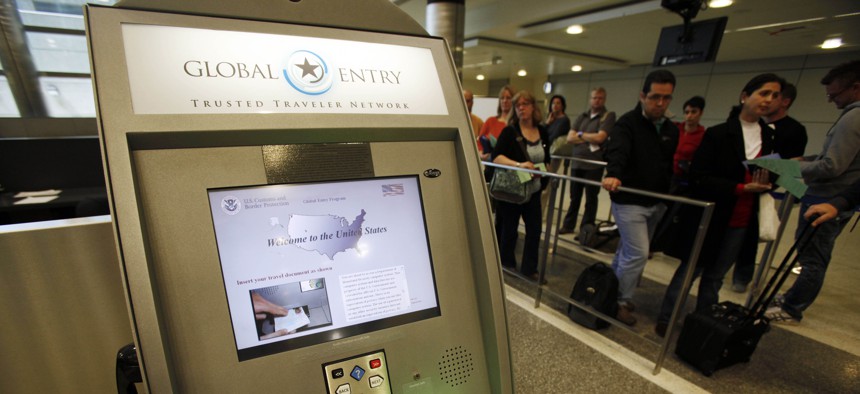New York Residents Get Banned From Global Entry Over State Immigration Law

A Global Entry kiosk in Los Angeles Airport expedites the entry process for international travelers. Reed Saxon/AP
STATE AND LOCAL ROUNDUP | Florida Senate passes parental approval requirement for abortions … Utah may eliminate grades for school ratings … West Virginia will debut smartphone voting.
The U.S. Department of Homeland Security announced Thursday that they would not allow New York residents to apply for or renew their passes for Global Entry, a program that expedites security checks for international flights. Chad Wolf, the acting secretary of homeland security, said that the federal agency made the change because of New York’s “Green Light Law.” The state law, which went into effect in December, allows undocumented immigrants to get driver’s licenses, while also preventing federal agencies like Immigration and Customs Enforcement and Customs and Border Protection from accessing the state’s Department of Motor Vehicles databases without a court order. “Although D.H.S. would prefer to continue our longstanding cooperative relationship with New York on a variety of these critical homeland security initiatives, this act and the corresponding lack of security cooperation from the New York D.M.V. requires D.H.S. to take immediate action to ensure D.H.S.’s efforts to protect the homeland are not compromised,” Wolf wrote in a letter to New York officials. Rich Azzopardi, a senior adviser to Gov. Andrew Cuomo, said that the policy change was only made because places like New York City have labeled themselves “sanctuaries cities” for undocumented migrants fearing deportation. “This is obviously political retaliation by the federal government, and we’re going to review our legal options,” Azzopardi said. The ban does not affect TSA PreCheck, but does include other programs administered by DHS that speed up clearance in customs and border crossings like NEXUS and SENTRI. Former acting ICE Director John Sandweg said that sanctuary city policies like the one in New York do not affect the ability of DHS to vet people for such programs. "It's ridiculous, and it's politicizing a program that's not about politics. It's trying to match two totally unrelated things … It's the kind of thing that's going to, frankly, politicize the department in a way that's going to undermine its mission moving forward,” he said. [Reuters; New York Times; CNN]
ABORTION | The Florida state Senate passed a bill that would reinstate a law requiring parental consent for minors seeking abortions, except in cases of medical emergencies. The state first passed a law with that provision in 1988, but the Florida Supreme Court found it to be unconstitutional because it violated teenagers’ right to privacy. The new bill allows teens to petition a court if they want to bypass the parental consent provision. Gov. Ron DeSantis expressed his support for the bill, which did not pass the legislature last year. “I hope that the Legislature will send me this session the parental consent bill that last year was passed by the House but not by the Senate,” he said. Sen. Bill Montford, a Democrat who formerly served as a school principal, said that he did not support the bill because of his experiences with young girls who confided in him that they didn’t trust their parents. “I’m not sure there’s anyone in this room who have dealt with more young people facing this issue. This issue has been brought to my attention more than you could imagine. A young lady would say, ‘I am afraid of my parents.’ There are some parents who are not parents,” he said. Five states—Oklahoma, Texas, Utah, Virginia, and Wyoming—require parental consent for abortions. [Miami Herald; WCTV]
SCHOOL RATINGS | The Utah legislature is considering legislation that would eliminate letter grades from the state report card for school ratings. Each school is graded on factors like test scores. Some legislators say that the state should just use a data dashboard that considers more elements like student growth and the progress of English learners, among other factors, as opposed to a letter grade rating system. Terry Shoemaker, executive director of the Utah School Superintendents Association, strongly supports the bill to eliminate school grades. “If you were to ask us what single policy issue that we wish would be different, this would be the issue,” he said. The bill is sponsored by state Rep. Marie Poulson, who said that the grades are unfair because they only consider a slice of what educators do. Eliminating letter grades “would be the best nonmonetary way to retain and attract our good teachers,” she said. The bill passed unanimously out of committee this week. [Deseret News]
SMARTPHONE VOTING | West Virginia will soon implement an electronic system that will allow people with physical disabilities to vote from home on their smartphones. This will make West Virginia the second jurisdiction in the country, after King County, Washington, to allow smartphone voting in certain elections. “We have a lot of people that have disabilities that can’t necessarily get out and go to the voting booths. But they surely deserve to have their voices heard,” said West Virginia Gov. Jim Justice. Some cybersecurity experts have questioned the push into online voting, saying it simply isn’t secure. Those warnings have escalated after the problems with an app used during the Iowa caucuses. [Law Street Media; Associated Press; Bloomberg News]
BANNED | A man in Missoula, Montana has been banned from city council meetings after bringing what appeared to be a sword to a meeting and threatening to “hunt down and eliminate” council members. City Council President Bryan von Lossberg said the threats are being taken seriously, even if the man didn’t intend to act on them. “It can be traumatizing,” he said. [KPAX]
Emma Coleman is the assistant editor for Route Fifty.
NEXT STORY: Seeking to Deter Would-Be Social Media Stars, Legislator Wants to Crack Down on Ice Cream Licking






